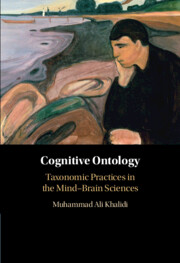Book contents
- Cognitive Ontology
- Cognitive Ontology
- Copyright page
- Dedication
- Contents
- Figures
- Contributors
- Preface
- Chapter 1 Cognitive Kinds
- Chapter 2 Concepts
- Chapter 3 Innateness
- Chapter 4 Domain Specificity
- Chapter 5 Episodic Memory
- Chapter 6 Language-Thought Processes
- Chapter 7 Cognitive Heuristics and Biases
- Chapter 8 Body Dysmorphic Disorder
- Chapter 9 Epilogue
- References
- Index
Chapter 6 - Language-Thought Processes
Published online by Cambridge University Press: 15 January 2023
- Cognitive Ontology
- Cognitive Ontology
- Copyright page
- Dedication
- Contents
- Figures
- Contributors
- Preface
- Chapter 1 Cognitive Kinds
- Chapter 2 Concepts
- Chapter 3 Innateness
- Chapter 4 Domain Specificity
- Chapter 5 Episodic Memory
- Chapter 6 Language-Thought Processes
- Chapter 7 Cognitive Heuristics and Biases
- Chapter 8 Body Dysmorphic Disorder
- Chapter 9 Epilogue
- References
- Index
Summary
This chapter considers an unusual cognitive category, which pertains to a kind of process rather than a kind of entity, state, or capacity, namely language-thought processes. The kind of process in question is often discussed in the cognitive science literature under the headings of “linguistic relativity” and “linguistic determinism.” These labels aim to identify a distinctive type of cognitive process, all of whose instances share something important in common, namely a fundamental or deep-seated influence of language on thought. By looking at some paradigmatic cases, I argue that there is nothing to distinguish this type of process from a broader cognitive phenomenon, namely concept acquisition or conceptual change. Moreover, within this broader category, there are two distinct kinds of process that are usually lumped together but that do not seem to have anything significant in common. There is an important difference between those processes that involve simultaneous recruitment of linguistic capacities and those that do not. These two types of process may constitute distinct cognitive kinds within the broader cognitive kind of concept acquisition or conceptual change.
Keywords
Information
- Type
- Chapter
- Information
- Cognitive OntologyTaxonomic Practices in the Mind-Brain Sciences, pp. 158 - 180Publisher: Cambridge University PressPrint publication year: 2023
